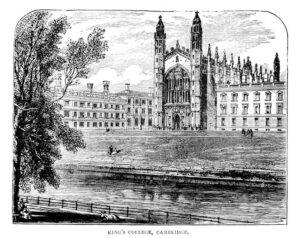Written by Haley Boyce

A master’s degree in creative writing is an intensive study in the craft of storytelling. And everyone has a story to tell. Writers come from all kinds of diverse backgrounds, and nowhere will this be more evident than in the classroom of a creative writing master’s program.
Each student’s purpose in earning a creative writing master’s degree is as varied as their own backgrounds and life experiences. Still, you’re likely to encounter others that share a purpose similar to your own. Personal growth or a career change… a desire to write a novel but unsure how to get beyond a quippy social media caption… a desire to be immersed in the craft and to master the art of storytelling… marketability as a job candidate when a creative writing master’s degree is combined with an undergraduate degree in a different field. Even if you’ve been conducting scientific research for the past ten years and are wondering if there’s a place for you in the writers’ room – you’ll discover there most certainly is.
The diversity of purpose among creative writing graduate students gathers unique imaginations together to generate incredible storytelling.
There’s truly no other experience so freeing and affirming as twelve writers being given the same prompt and churning out twelve wildly different stories. You’re on the right track if the thought of this sets your heart to racing.
The fact that you’re here means you’ve completed your bachelor’s degree, are nearly finished with it. Or maybe you’re about to begin an undergraduate program and already planning what life will look like for you in about four years. It’s even possible that you’re reading this with a doctorate hanging on your wall and are considering a postdoctoral education.
Wherever you are in your education journey, there are bound to be questions you need answered about what earning a creative writing master’s degree might look like.
The World’s Most Illustrious Institutions Have Been Teaching Writing and Conferring Master’s Degrees for Centuries
 In the 5th through 15th centuries, master’s degrees – or Magisters in medieval Europe – were only given to university graduates when they began to teach.
In the 5th through 15th centuries, master’s degrees – or Magisters in medieval Europe – were only given to university graduates when they began to teach.
Later, it became a degree earned “in course” to recipients of a baccalaureate degree who were able to maintain a respectable lifestyle and paying a small fee.
This is the way it was for hundreds of years until the master’s degree began to develop into what we know it as today: A degree earned through the advanced study of a particular field. The “modernized” version of the master’s degree that came to America in the 1870s is the model on which today’s MFA and other creative writing master’s degrees are built.
The Only Thing Predictable About an MFA or Other Master’s in Creative Writing is Basic Program Structure
A master’s degree in creative writing takes between one and three years to complete, with consideration to taking on a part-time or full-time course load. Some schools require the program to be completed within five years from your start date.
You can expect your coursework to start out with a close examination of literature and writers’ workshops, then taper into more independent study the closer you get to writing your thesis.
Your thesis will naturally be a creative writing project like your novel, a play, a book of short stories, or a screenplay. The length of the thesis will vary by program. Some require the complete project while others set a minimum of fifty pages.
Differences Between an MFA and MA in Creative Writing Come Down to Intensity, Duration, and Purpose
 The big divide between a Master of Fine Arts and a conventional Master of Arts in Creative Writing comes down to a particular aspect of purpose. The MFA is generally recognized as being better suited to a career in teaching the art of creative writing, particularly at the collegiate level.
The big divide between a Master of Fine Arts and a conventional Master of Arts in Creative Writing comes down to a particular aspect of purpose. The MFA is generally recognized as being better suited to a career in teaching the art of creative writing, particularly at the collegiate level.
It’s not designed exclusively to prepare teachers and university faculty by any means, and most MFA students are more interested in being authors than instructors, but the degree does put the option of a teaching or tenure track position squarely on the table.
An MFA will offer smaller class sizes, allowing you to receive personalized instruction from professors and feedback in a workshop setting.
Getting accepted to an MFA program can be competitive, so be prepared to apply to several programs that you’d be happy to be part of. If you aren’t accepted into your top choice, consider the possibility of beginning an MA in creative writing and then transferring into an MFA program. Doing so can give you an edge that other applicants don’t have.
Courses you can expect to take in a program for a creative writing master’s degree are:
- Methods and Materials of Literacy Research
- Writing the Short Story
- The Art of the Pitch
- Fairy Tales
- Creative Nonfiction
- The Personal Essay
- American Poetry
- Independent Study
- Crafting the Thesis
These last two classes go by different names depending on the college or university, but their purpose is along the same lines, as they are meant to ease you into writing your thesis. Any former graduate student will tell you, the more you work under the guidance of your thesis director the better your results will be. It serves as the last bit of hand-holding you get and good preparation for how you will ultimately approach all of your future writings after graduation – independently.
An MFA or Other Master’s Degree in Creative Writing Separates the Authors from the Amateurs
From only 64 creative writing MFA programs in the entire United States in 1994, the number has ballooned to over 300 today. Even so, spots are limited, and admissions can be competitive.
Sure, some people will earn their creative writing master’s having already published a book or two, but most will be unknown even in local literary circles. Without exception though, every student will be hungry to develop the writing skills and discipline that only an MFA or similar master’s program can provide:
The Art of Storytelling
Are you that person at the dinner party who holds a captive audience when you tell about the time you locked your keys in the car while you were still in your pajamas because all you wanted was a quick cuppa from the drive through? Or maybe you’re the one who was genuinely mortified by said experience and have no other way to process it other than to put it in writing. In any case, guess what? You’re a storyteller, and a master’s can bring out the best of that characteristic.
Time Management
Listen, when you’re a writer you’re only as rich as the number of words you produce for your publisher. If you have any intention at all of turning your words into dollars to keep a roof over your head, you’ve got to be disciplined enough to get your assignments done on time. Missed deadlines means missed opportunities for publication. Any master’s program in creative writing worth its salt will help you become better at managing the one thing every writer wishes there was more of.
Networking
It can’t be stated enough – it’s not what you know, it’s who you know until you meet the people who believe in your ability to cut it as a writer. This is something very difficult to come by for novice writers outside of a creative writing master’s degree program. Your instructors will be your first connection. Then your classmates, who inevitably become colleagues and confidants, may connect you with the people (who connect you with the people) who are open to hearing your elevator pitch and reading the first few chapters of your novel.
Self-promotion
This is probably one of the most uncomfortable skills to master while making your way in the publishing world. But if you pause your jittering nerves long enough to consider why you need it, it will all make perfect sense (even if you wish it didn’t). As the writer of your blog, novel, social media content – or the admissions statement letter you’re working on for your MFA program – you are the very first person who believed in your work. There was a reason you created this piece or honed this skill. Make others believe in your creativity for the same reasons you do. There’s a purpose to your craft, whatever your focus may be, and it’s part of your job to get others to believe in it too. This is the self-realized confidence you’ll come away with from a master’s program in creative writing.
Creativity
Writing is an art. We arrange words on a page in order to evoke emotion, to tell stories that would otherwise be kept silent. There is no wrong way to tell a story, but there are ways to write a story so its published in its best form. This is why we edit and revise, edit and revise, and then edit and revise some more. As a writer, your job is to get that first draft on the page, then polish it until the story that is meant to be told is presented in its truest form. How you get there is entirely up to your dedication to the craft of authenticity and artistry, but a master’s degree in creative writing will teach you the techniques.
Self-advocacy and negotiation skills
Art comes at a price. In all honesty, you’re going to work some very low-paying jobs as a writer and will likely have work published for the value of the exposure even if it doesn’t help pay the electric bill. But there will be a turning point when people will start paying you for your words. We promise. Pay varies depending on the project. Having an agent who works a deal for your novel is very different from freelance content contributions or copywriting, which typically pays per word. In cases such as these, the average rate is five to ten cents per word, but some jobs come as low as three cents per word, so be prepared to either take the money and byline where you can get it, or seek something that matches your worth in experience and talent. Negotiation comes down to being realistic about your experience and skill in comparison to the competition. A master’s degree will give you the confidence to know what you’re worth
Editing and Proofreading
Your work is only as good as your final revision. There are a lot of sayings about that good ol’ first draft (some too salty to share here), but the sentiment is true no matter how you phrase it – that first draft is not your best work. Your MFA or other master’s degree in creative writing will provide a built-in workshop with trusted peers. Over time, your skin will grow thick and you will learn to love the sting of criticism far more than any patronizing praise. It’s then that you’ll be able to revise that first draft with endless devotion to your premise and craft, not to your haughty ego.
Online Versus In-Person MFA and Other Master’s in Creative Writing
 Probably one of the most enriching parts of a master’s program is the people you’ll meet from just about every walk of life.
Probably one of the most enriching parts of a master’s program is the people you’ll meet from just about every walk of life.
Take it from those of us who have been in both virtual and in-person graduate courses – creative energy comes from the tension of diversity and nowhere is this amplified more than in an online graduate-level creative writing course.
Take a second to imagine the type of person you think might be in your program. Okay, now leave a couple of seats open for types of people you didn’t even know could exist.
It’s impossible to enter a graduate class in creative writing without having been made into a new person because of all the different creative minds you will encounter. Because online classes are more accessible than those held on campus, you are more likely to encounter these wonderfully diverse minds.
MA/MFA Dual Degree Creative Writing Options
 Some of us are crazy enough to go for two graduate degrees at once. Why? Well, the multifaceted approach to writing, for starters. A dual graduate degree program will study two related subjects simultaneously. For writers, this usually means earning a master’s degree in English literature and a Master of Fine Arts in creative writing.
Some of us are crazy enough to go for two graduate degrees at once. Why? Well, the multifaceted approach to writing, for starters. A dual graduate degree program will study two related subjects simultaneously. For writers, this usually means earning a master’s degree in English literature and a Master of Fine Arts in creative writing.
An MA/MFA dual degree creative writing program could be one of the most ideal scenarios for someone who has interests in multiple career options after graduation. Both set you up for success as a writer in any number of word-based occupations including, foremost, education at the secondary, community college, or university level; publishing, marketing, public relations, and social media specialist.
The application process for an MA/MFA dual degree creative writing program at a college or university is a bit more arduous compared to individual MA or MFA programs. If you think you might choose this dual program as your path, be prepared to meet the following application requirements:
- Be admitted to both the MA and MFA degree programs
- Be enrolled concurrently in both MA and MFA degree programs
- Complete all requirements for each degree program, including the thesis for both
- Students applying to the dual degree program must do so before completing a certain amount of credits (refer back to seeking an advisor’s guidance before enrolling in either of the programs)
Coursework for a dual MA/MFA creative writing degree program can include a required set of courses and additional coursework for both the MA and MFA programs.

